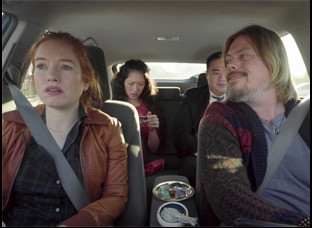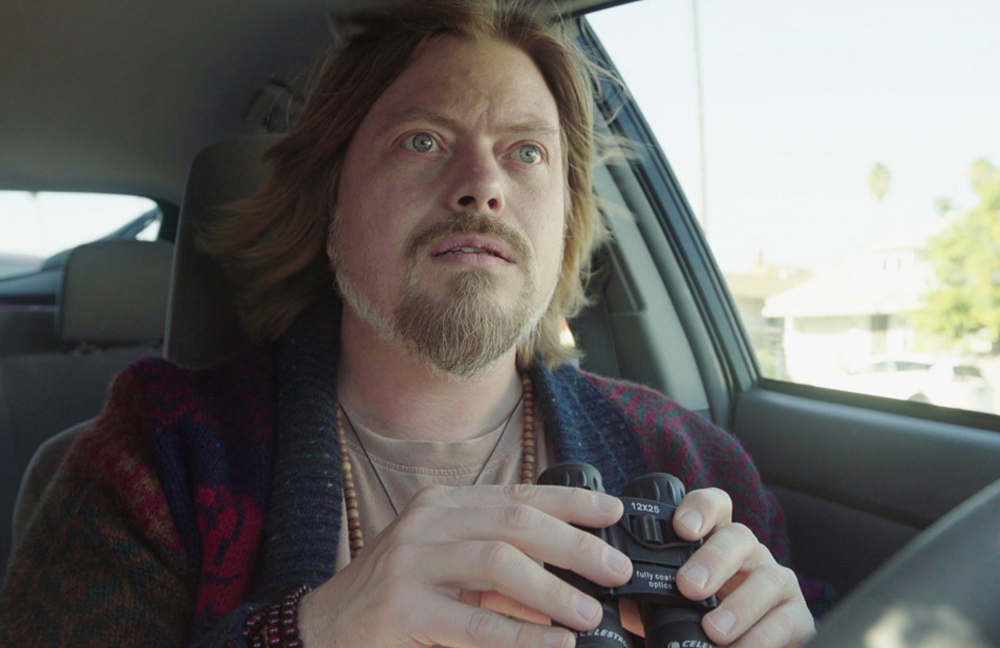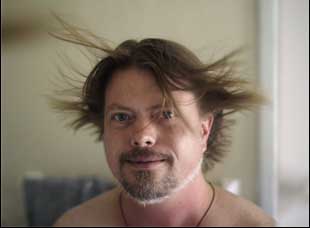When Linas Phillips made a triumphant return to Sundance with “The Ride” this past week a decade after the actor/writer/director first came to Park City, helping to christen the festival’s NEXT section with his debut feature “Bass Ackwards,” it was as if little had changed.
“[“Bass Ackwards”] was also a guy in a car, which is funny because instead of a guy driving across the country after a breakup, it’s a guy driving around in a Lyft after a breakup [in “The Ride”],” says Phillips, who drew upon some real-life experience as a ride-share driver to create his new six-episode comedy which premiered at the festival in its indie episodic section.
Yet “The Ride” showcases Phillips’ winning persona and long-held talent for showing the progress one can make when the world doesn’t seem to move fast enough, finding himself in the driver’s seat but not exactly behind the wheel as Wayne, a chauffeur who has boosted his own downtrodden spirits with new age teachings and often can’t resist injecting passing along ideas that have helped him into chatting with the passengers who step inside his car. Occasionally, a kind word can do wonders as he picks up a number of people with relationship issues, from a quarreling couple (Anna Seregina and Alex Karpovsky) who bicker over going to the beach to a woman (Joslyn Jensen) knowing she’s hit a dead end in her latest romance but unready to move on, but then again Wayne’s unsolicited advice can often irritate — as does the burning sage he keeps going – and as his own anxieties about Dana (Maria Thayer), a single mother he’s started seeing who seems more committed to playing the field than to him, creep into casual conversations, the comedy takes its share of unexpected turns.
Phillips packs plenty inspiration — and perspiration — into “The Ride”’s bite-sized episodes, but as he explained that after being in so many stressful situations as Wayne, he wasn’t sweating the series’ Sundance debut and spoke about the challenges of setting a production largely inside a car, the creative opportunities that opened up in developing his first series and bringing his own experience of being a rideshare driver into the mix.
“The Ride” came about a year-and-a-half ago when I was new to L.A. I was struggling and ride-share driving in real life. I told Jay Duplass, who’s a buddy of mine, about this and he was like really feeling for me and DBP Donut, which is his and Mark [Duplass’] new experimental company making short-form series, wanted to do a show about a ride-share driver and Jay immediately thought of me. [laughs] He was like, “Do you want to make a show about how horrible your real life is?” And I was like, “Yep, let’s do it.”
What inspired this spiritual driver Wayne?
Unfortunately, he’s more similar to me than I’d like to admit, but it’s an exaggerated version. I was dealing with a heartbreak and struggling with depression at times. Spiritual teachings by Eckhart Tolle, for example, were really helpful for me and I was still Lyft driving, so sometimes I was a little too overeager to share this stuff that I was clinging to in order to pull myself up out of bed.
[But the show is inspired] was more by the energy of it, of me as a filmmaker Lyft driving and feeling embarrassed by that, more so than specific details of rides that I had in real life. There’s one that’s pretty close to one of the episodes where a woman in real life was talking about her boyfriend, standing up for herself and saying she was hurt by something that happened between them, and I was [in the front seat] piecing it together, because I couldn’t resist overhearing it and I was like, “Oh, I’m really proud you stood up for yourself.” [laughs] Which in the moment sort of worked, but it was also totally inappropriate, and it was my own feeling so lonely and wanting to justify my new identity as a Lyft driver by also being this spiritual coach for people. It’s funny how even though it can be well-intentioned, it’s more about my own frustration with where I am in my life rather than trying to help people, which is what I wanted to say with the show.Did you have certain actors in mind for the passengers?
Yeah, I wrote a lot of the scenes for actors I had in mind. There were a lot of comedians that I really loved that I’d go see perform a lot like Anna Sergina and Punkie Johnson that are part of the comedy scene in L.A., so it’s really great to find scenes for them to be in, even if I didn’t write it for them specifically, and then actors who I’m friends with and have worked with in the past, I’d convince them to do this small thing [because] the writing was good, but also I tried to tailor it for them or get a lot of input. Most of the time I would read through the scene with them and make a lot of cuts and changes.
It was interesting to see Joslyn Jensen, who I know primarily as an actress – and appears as a pivotal character in the show – was actually an AD and a script supervisor on this.
Yeah, and she actually co-wrote one of the episodes with me. She was really my rock and main collaborator during the shoot creatively. She’s an amazing actor, and she is a writer too, so it was really good and because she knew me personally, she was there to remind me of real life scenarios, like if I told her about a horrible date I was on or some detail of me like desperately trying to make it work, she was like “We’ve got to put into the scene with Wayne,” so we had a shorthand. She was also able to reaffirm when the insecurities come up [where I’d think], “Oh, I don’t want to put in that, that’s too personal,” and she’d say “That’s so funny, you’ve got to put that in.”

It was. In some ways, it was intimidating because I felt like it had to be punchier or do something different with my voice, but it also forced me to put more plot into fewer pages because I [thought] there needs to be a lot of turns in each episode, which might only be six or seven minutes long. I was very inspired by the structure of “Curb Your Enthusiasm” because it fits [in] so many things and plants things and does callbacks, so ultimately I really did want there to be a throughline, but also not make it feel too episodic. I had this girlfriend character [played by Maria Thayer], which is another thing that Wayne is struggling with, trying to force this relationship even though it’s pretty clear that it’s not meant to be. [laughs] Which is funny and heartbreaking and something I also could relate to in real life, so the format informed the writing in a good way.
Was it difficult to shoot so much inside a car?
Yeah, it was pretty hard for me acting and directing and then also thinking about the edit in my head while we’re driving down the street and there’s a camera blocking my vision, so it was a real challenge to not suck as an actor and to be there for the other actors. But my DP Nate Miller was so helpful in making it happen and yeah, we couldn’t really have a lot of help from the production when we’re out of the car doing the scene because we had a follow car, but it took so long to pull over and get any help, so it was really just us shooting one take. I don’t recommend it. [laughs] But it was also a way for us to get it done in such a short time for such a lo-fi shoot.
For the opening credits, how long did you spend filming yourself with a blow dryer aimed at your face?
I did those all in one day and yeah, having a blow dryer in your face all day is not good for your skin, I realized. [laughs] And I was burning my sage into my eyes all day – [I have a] picture after that in the evening and my eyes were totally bloodshot red. Those were actually the last things I shot, just me in my bathroom all by myself – one DP friend help me set it up and then I went for it.
Who did the great opening music?
Braedon Speakman, who’s a great young up-and-coming composer. I had seen his band perform and I saw him doing live music for comedy shows and he was making music that was almost too good for the show – [I had to tell him] “Okay, that sounds amazing, but let’s make sure it’s funny but also sort of bad too.” But he totally elevated it, just because of the awkwardness of Wayne trying to impose his spiritual teaching on his passengers, there’s a lot of earnestness and heart to his little journey, so the music reflected that.
What’s it like bringing this into the world?
I’m surprisingly not too nervous about it. Like I said about working with Joslyn, I put so many moments into the show about things and experiences that I care so much about, I’m just excited to share it and I know it’s specific and from the heart. I’ve done some screenings for friends and I was really nervous before that, but it was so nice to see what things are playing and it seems like a nice mixture of humor, absurdity and unrelenting vulnerability. [laughs]
“The Ride” does not yet have distribution.





